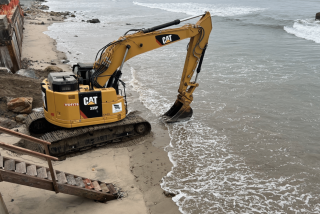The Sand and the Fury in Malibu
- Share via
Launching a summer campaign on behalf of public sunbathing, the California Coastal Commission has targeted one of Malibu’s most exclusive strands -- Broad Beach -- ordering an end to no-trespassing signs and security guards on all-terrain vehicles who shoo visitors off the dry sand.
The commission, established decades ago to protect public beach access, has demanded that homeowners remove the “Private Property, Do Not Trespass” signs in the sand. It has also demanded the community discontinue motorized beach patrols.
And the commission took the unusual step this week of posting aerial photos with lot-by-lot descriptions on its website, detailing precisely the public access easements where beachgoers can legally drape their towels and plant their umbrellas.
The fight over Broad Beach is emerging as a classic clash between public access and private property rights of the area’s homeowners, who include celebrities Goldie Hawn, Steven Spielberg, Dustin Hoffman and Danny DeVito, who starred with Gov. Arnold Schwarzenegger in the movie “Twins.”
The homeowners contend that the private-property signs and the beach security patrols both existed before the Coastal Commission was established and thus fall outside the panel’s jurisdiction.
Earlier this year, the homeowners group, the Trancas Property Owners Assn., filed a lawsuit challenging some of the public access easements, which it claimed were extracted by “coercion” in a manner that “shocks the conscience.”
The association also has asked for help from Steve H. Kram, an executive with Schwarzenegger’s former talent agency who was recently appointed by the governor to the 12-member Coastal Commission. In a recent letter to Kram, the association suggested meeting with a “small working group” of politically appointed commissioners who could overrule the staff’s actions regarding Broad Beach.
The commission’s staff said they targeted Broad Beach because they’ve received more complaints about signs and guards on that short strip of sand than anywhere else along the state’s 1,100-mile coastline.
“The guards at Broad Beach are ATV bullies,” said Peter Douglas, the commission’s executive director. “I’m not trying to call people names. That’s the way people have been treated by them.”
The commission has begun its first wave of enforcement by sending letters to eight homeowners, asking each of them to remove the “Private Property” sign on the beach in front of their homes.
In the case of all eight, the signs are illegal because the homeowners failed to obtain the required coastal development permit to install them, according to the letters obtained by The Times under the California Public Records Act.
In one case, the property owner had agreed not to post any signs on his land -- an agreement he had recorded with property records in exchange for commission permission to demolish a home and build a new one four years ago.
In the seven other cases, the signs are on properties on which the owners have granted easements providing public access in exchange for permits to build or remodel their homes. The public easements typically cover a swath of dry sand that extends 25 feet inland from the mean high-tide line.
Everything seaward of that line -- essentially the surf zone and the wet sand -- allows unfettered public access because it is state tidelands.
Broad Beach’s private property signs, according to the letter to the homeowners association, “give the impression that the entire beach is private.” Indeed, depending on the tide, ocean waves can be seen lapping against the signs.
The commission’s letter asks for the signs to be removed, and for use of the ATV-riding security guards to be discontinued. The patrols also require a permit from the Coastal Commission, which the homeowners association has not received, states the June 23 letter signed by Douglas.
“Moreover, the guards appear to instruct people to leave the beach without regard to whether they are on state tidelands, public access easements owned by the state, or land deed-restricted for public access,” the letter states. “This activity prevents the public from enjoying a public beach area provided to them by the state and state law.”
Marshall B. Grossman, a Broad Beach homeowner, lawyer and former coastal commissioner, said the commission is confused about its authority. The beach patrols and the signs both predate the 1972 voter approval of the Coastal Act, Grossman said, producing minutes from a 1971 association board meeting as evidence.
Broad Beach homeowners, he said, would prefer that the public stop just down the coast at Zuma Beach, which he calls a “world-class beach” offering lifeguards, food service, ample parking and public restrooms.
Broad Beach has none of those, he said, and homeowners grow weary of the brazenness of some beachgoers. “Because of the absence of sanitary facilities, many people will approach the residences and ask to use their bathrooms,” Grossman said. “That’s not acceptable.”
The security guards, he said, provide a public service by rescuing people from the surf as well as picking up trash left by visitors. “We believe that this patrol is essential to the health, safety and security of the residents, and we intend to keep it.”
As for the signs on the beach, Grossman said, “I think they are a blight. They are there only to protect against the loss of property through prescriptive use.”
The homeowners expect to retain those as well, he said.
The battle at Broad Beach is different from skirmishes involving public access at other beaches. More common in California are disputes over “vertical” easements, which are paths across private property to allow the public to get from the nearest road to the shoreline.
In one high-profile case, music producer David Geffen spent years suing the commission to avoid opening the gates to a walkway across his property on Malibu’s Carbon Beach. The billionaire partner in DreamWorks SKG agreed to open the public pathway in 1982, in exchange for building the first part of his ever-growing compound across multiple lots. The public is effectively barricaded from that stretch of beach by miles of shoulder-to-shoulder houses.
By contrast, getting to Broad Beach is easy. Its two county-owned pathways from the road were part of the original subdivision. Those narrow corridors -- set off by chains -- are virtually the only places on dry sand where the public can be without fear of being rousted.
The fight has centered on the “lateral” easements, which run along the shore and across the seaward edge of homeowners’ yards. So far, 52 of the 108 lots at Broad Beach have such public easements, strips often 25 feet wide beginning at the mean high tide. They are intermittent, though, creating a confusing patchwork of public beach.
The commission decided to post all of them on its website, www.coastal.ca.gov, to help the public and the police.
Last August, Commissioner Sara Wan decided to test public access on Broad Beach by going there herself. She sat down on one easement and was immediately challenged by a security guard. Five sheriff’s deputies soon arrived.
Wan refused to budge and took the opportunity to lecture the deputies on the law. She was left alone after that.
This week, Sheriff’s Capt. Tom Martin said he has met with security guards and homeowners to avoid a repeat of that publicized altercation. He said he planned to distribute the commission’s photos to inform his deputies as to which portions of the beach are public and which are private property.
Furthermore, he said his deputies would respond only to calls about trespassers, if the homeowner was present. “We worked very hard on the off-season to ensure that we protect the public’s right to use public property and the property owners to be secure on their property.”
In its lawsuit, the Trancas Property Owners Assn., representing Broad Beach homeowners, claims the public easements are illegal.
The lawsuit seeks to apply a 1987 U.S. Supreme Court decision that calls the commission’s old requirements for these easements “an out-and-out plan of extortion.” The court limited the demand for such easements to cases in which development could infringe on public access, such as a seawall built close to the surf.
In response to that ruling, the commission changed its practice. It offered property owners a choice: Voluntarily grant public easements to the state or go through the costly, time-consuming process of conducting studies that prove their proposed developments will not interfere with public access.
The lawsuit by Broad Beach homeowners contends that practice is, in fact, coercive.
More to Read
Sign up for Essential California
The most important California stories and recommendations in your inbox every morning.
You may occasionally receive promotional content from the Los Angeles Times.









